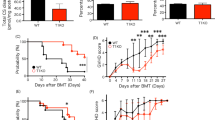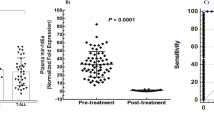Abstract
Acute Graft-versus-host disease (GVHD) is a major immunological complication after allogeneic hematopoietic cell transplantation and a better understanding of the molecular regulation of the disease could help to develop novel targeted therapies. Here we found that a G/C polymorphism within the human microRNA-146a (miR-146a) gene of transplant recipients, which causes reduced miR-146a levels, was strongly associated with the risk of developing severe acute GVHD (n=289). In mice, deficiency of miR-146a in the hematopoietic system or transfer of recipient-type miR-146a−/− dendritic cells (DCs) enhanced GVHD, while miR-146a mimic-transfected DCs ameliorated disease. Mechanistically, lack of miR-146a enhanced JAK2–STAT1 pathway activity, which led to higher expression of class II-transactivator (CIITA) and consecutively increased MHCII-levels on DCs. Inhibition of JAK1/2 or CIITA knockdown in DCs prevented miR-146a−/− DC-induced GVHD exacerbation. Consistent with our findings in mice, patients with the miR-146a polymorphism rs2910164 in hematopoietic cells displayed higher MHCII levels on monocytes, which could be targeted by JAK1/2 inhibition. Our findings indicate that the miR-146a polymorphism rs2910164 identifies patients at high risk for GVHD before allo-HCT. Functionally we show that miR-146a acts as a central regulator of recipient-type DC activation during GVHD by dampening the pro-inflammatory JAK–STAT/CIITA/MHCII axis, which provides a scientific rationale for early JAK1/2 inhibition in selected patients.
This is a preview of subscription content, access via your institution
Access options
Subscribe to this journal
Receive 12 print issues and online access
$259.00 per year
only $21.58 per issue
Buy this article
- Purchase on SpringerLink
- Instant access to the full article PDF.
USD 39.95
Prices may be subject to local taxes which are calculated during checkout







Similar content being viewed by others
References
Lim LP, Lau NC, Garrett-Engele P, Grimson A, Schelter JM, Castle J et al. Microarray analysis shows that some microRNAs downregulate large numbers of target mRNAs. Nature 2005; 433: 769–773.
Stickel N, Prinz G, Pfeifer D, Hasselblatt P, Schmitt-Graeff A, Follo M et al. miR-146a regulates the TRAF6/TNF-axis in donor T cells during GVHD. Blood 2014; 124: 2586–2595.
Taganov KD, Boldin MP, Chang KJ, Baltimore D . NF-kappaB-dependent induction of microRNA miR-146, an inhibitor targeted to signaling proteins of innate immune responses. Proc Natl Acad Sci USA 2006; 103: 12481–12486.
Nahid MA, Pauley KM, Satoh M, Chan EK . miR-146a is critical for endotoxin-induced tolerance: Implication in innate immunity. J Biol Chem 2009; 284: 34590–34599.
Labbaye C, Testa U . The emerging role of MIR-146A in the control of hematopoiesis, immune function and cancer. J Hematol Oncol 2012; 5: 13.
Jazdzewski K, Murray EL, Franssila K, Jarzab B, Schoenberg DR, de la Chapelle A . Common SNP in pre-miR-146a decreases mature miR expression and predisposes to papillary thyroid carcinoma. Proc Natl Acad Sci USA 2008; 105: 7269–7274.
Gazouli M, Papaconstantinou I, Stamatis K, Vaiopoulou A, Zeglinas C, Vassiliou I et al. Association study of genetic variants in miRNAs in patients with inflammatory bowel disease: preliminary results. Dig Dis Sci 2013; 58: 2324–2328.
Yang Y, Zhang K, Zhou R . Meta-analysis of pre-miRNA polymorphisms association with susceptibility to autoimmune diseases. Immunol Invest 2014; 43: 13–27.
Zeiser R, Burchert A, Lengerke C, Verbeek M, Maas-Bauer K, Metzelder SK et al. Ruxolitinib in corticosteroid-refractory graft-versus-host disease after allogeneic stem cell transplantation: a multi-center survey. Leukemia 2015; 29: 2062–2068.
Lofgren SE, Frostegard J, Truedsson L, Pons-Estel BA, D'Alfonso S, Witte T et al. Genetic association of miRNA-146a with systemic lupus erythematosus in Europeans through decreased expression of the gene. Genes Immun 2012; 13: 268–274.
Bogunovic M, Ginhoux F, Wagers A, Loubeau M, Isola LM, Lubrano L et al. Identification of a radio-resistant and cycling dermal dendritic cell population in mice and men. J Exp Med 2006; 203: 2627–2638.
Young JW, Merad M, Hart DN . Dendritic cells in transplantation and immune-based therapies. Biol Blood Marrow Transplant 2007; 13: 23–32.
Shlomchik WD, Couzens MS, Tang CB, McNiff J, Robert ME, Liu J et al. Prevention of graft versus host disease by inactivation of host antigen-presenting cells. Science 1999; 285: 412–415.
Koyama M, Kuns RD, Olver SD, Raffelt NC, Wilson YA, Don AL et al. Recipient nonhematopoietic antigen-presenting cells are sufficient to induce lethal acute graft-versus-host disease. Nat Med 2012; 18: 135–142.
Cooke KR, Gerbitz A, Crawford JM, Teshima T, Hill GR, Tesolin A et al. LPS antagonism reduces graft-versus-host disease and preserves graft-versus-leukemia activity after experimental bone marrow transplantation. J Clin Invest 2001; 107: 1581–1589.
Subramanian A, Tamayo P, Mootha VK, Mukherjee S, Ebert BL, Gillette MA et al. Gene set enrichment analysis: a knowledge-based approach for interpreting genome-wide expression profiles. Proc Natl Acad Sci USA 2005; 102: 15545–15550.
Steimle V, Siegrist CA, Mottet A, Lisowska-Grospierre B, Mach B . Regulation of MHC class II expression by interferon-gamma mediated by the transactivator gene CIITA. Science 1994; 265: 106–109.
Miller DM, Rahill BM, Boss JM, Lairmore MD, Durbin JE, Waldman JW et al. Human cytomegalovirus inhibits major histocompatibility complex class II expression by disruption of the Jak/Stat pathway. J Exp Med 1998; 187: 675–683.
Martin P, Rizzo JD, Wingard JR, Ballen K, Curtin PT, Cutler C et al. First- and second-line systemic treatment of acute graft-versus-host disease: recommendations of the American Society of Blood and Marrow Transplantation. Biol Blood Marrow Transplant 2012; 18: 1150–1163.
Jurkin J, Schichl YM, Koeffel R, Bauer T, Richter S, Konradi S et al. miR-146a is differentially expressed by myeloid dendritic cell subsets and desensitizes cells to TLR2-dependent activation. J Immunol 2010; 184: 4955–4965.
Park H, Huang X, Lu C, Cairo MS, Zhou X . MicroRNA-146a and microRNA-146b regulate human dendritic cell apoptosis and cytokine production by targeting TRAF6 and IRAK1 proteins. J Biol Chem 2015; 290: 2831–2841.
Jackson SH, Yu CR, Mahdi RM, Ebong S, Egwuagu CE . Dendritic cell maturation requires STAT1 and is under feedback regulation by suppressors of cytokine signaling. J Immunol 2004; 172: 2307–2315.
Tang Y, Luo X, Cui H, Ni X, Yuan M, Guo Y et al. MicroRNA-146A contributes to abnormal activation of the type I interferon pathway in human lupus by targeting the key signaling proteins. Arthritis Rheum 2009; 60: 1065–1075.
Lu LF, Boldin MP, Chaudhry A, Lin LL, Taganov KD, Hanada T et al. Function of miR-146a in controlling Treg cell-mediated regulation of Th1 responses. Cell 2010; 142: 914–929.
Harding CV, Boom WH . Regulation of antigen presentation by Mycobacterium tuberculosis: a role for Toll-like receptors. Nat Rev Microbiol 2010; 8: 296–307.
Spoerl S, Mathew NR, Bscheider M, Schmitt-Graeff A, Chen S, Mueller T et al. Activity of therapeutic JAK 1/2 blockade in graft-versus-host disease. Blood 2014; 123: 3832–3842.
Acknowledgements
This study was supported by the ERC Consolidator grant (681012 GVHDCure to RZ), DFG (SFB1160 P14 to RZ), the German Cancer Consortium (DKTK Program Molecular Targeted Therapy) to RZ and NvB and the Excellence Initiative of the German Research Foundation (GSC-4, BIOSS) II, projects B4 and B13 to TB and RZ, respectively).
Author contributions
NS designed the experiments, performed the experiments, evaluated the data and wrote the manuscript; KH designed and performed the experiments and evaluated the data. DM contributed to experimental design, performed the experiments and analyzed the data. GP, WM, AH, DW, PB and MK helped with experiments and data analysis; DP performed microarray analysis; AS-G performed histopathological scoring; AH, PB, DW performed experiments TB, NvB and JD contributed to experimental design and data interpretation. J Finke helped to analyze the patient samples; J Ferrara helped to design experiments and to analyze data. US helped to perform the SNP genotype analysis; and RZ developed the overall concept, analyzed the data, and helped to write the manuscript.
Author information
Authors and Affiliations
Corresponding author
Ethics declarations
Competing interests
The authors declare no conflict of interest.
Additional information
Supplementary Information accompanies this paper on the Leukemia website
Supplementary information
Rights and permissions
About this article
Cite this article
Stickel, N., Hanke, K., Marschner, D. et al. MicroRNA-146a reduces MHC-II expression via targeting JAK/STAT signaling in dendritic cells after stem cell transplantation. Leukemia 31, 2732–2741 (2017). https://doi.org/10.1038/leu.2017.137
Received:
Revised:
Accepted:
Published:
Issue date:
DOI: https://doi.org/10.1038/leu.2017.137
This article is cited by
-
Ruxolitinib plus steroids for acute graft versus host disease: a multicenter, randomized, phase 3 trial
Signal Transduction and Targeted Therapy (2024)
-
ROCK1/2 signaling contributes to corticosteroid-refractory acute graft-versus-host disease
Nature Communications (2024)
-
CXCL9 influences the tumor immune microenvironment by stimulating JAK/STAT pathway in triple-negative breast cancer
Cancer Immunology, Immunotherapy (2023)
-
Post-therapeutic microRNA-146a in liquid biopsies may determine prognosis in metastatic gastrointestinal cancer patients receiving 90Y-radioembolization
Journal of Cancer Research and Clinical Oncology (2023)
-
Pan-cancer analysis of oncogenic TNFAIP2 identifying its prognostic value and immunological function in acute myeloid leukemia
BMC Cancer (2022)



